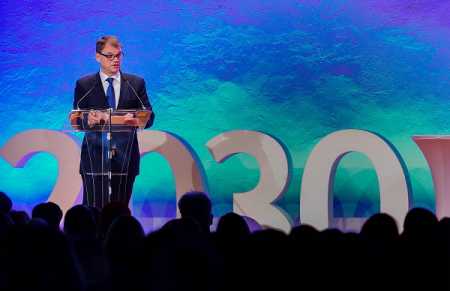Wed, 09 Nov, 2016 12:09:50 AM FTimes Report, Nov 9  Finland's Prime Minister Juha Sipila gives a speech during the opening of the 7th Strategy Forum of the The European Union Strategy for the Baltic Sea Region (EUSBSR), in Stockholm, Sweden, on November 8, 2016. Photo AFP-LEHTIKUVA Prime Minister Juha Sipilä said on Tuesday that the Baltic Sea Region in 2030, in their vision , is the world leader in the circular economy and the bio-economy.
“The Baltic Sea is much cleaner and we have taken actions that have helped to reduce the effects of climate change,” the PM said at the 7th Annual Forum of the EU Strategy for the Baltic Sea Region in Stockholm.
Sipilä called upon all Baltic Sea member states to jointly support it within the EU in reducing the sources of marine wastes.
The region is also in a leading position in the use of digital services, big data and the Internet of Things. Moreover, it will continue to support a world-class sustainable maritime industry, the PM mentioned.
“Our region offers great potential in both the circular economy and the bio-economy. The move towards the circular economy is likely to cut carbon emissions by almost 70% by 2030,” he mentioned.
“In the government programme of Finland, the bio-economy and clean solutions are high priorities. The transition is bigger than ever. We will find solutions and adopt regulations that promote circularity.”
Six years ago Finland committed to becoming a model for recycling and improving the Archipelago Sea in 2020. So far, more than 50 projects have been implemented, resulting in greater recycling efforts and better water quality in this sea area.
The Nordic Council of Ministers has taken on the work of implementing the EU Strategy for the Baltic Sea Region. The focus areas are bio-economy, innovation and sustainable cultural relations.
The Council is also supporting the transition away from fossil fuel dependency towards a sustainable bio-based economy in the Baltic Sea Region.
The PM welcomed the establishment of the Baltic Sea Region Bio-economy Council that will provide a platform for policy dialogue and development.
The countries of the Baltic Sea Region perform well in the Digital Economy and Society Index, especially in citizens’ engagement in the digital economy, eGovernment and digital business. This provides a sound basis for the Baltic Sea Region to be a leading region in the Digital Single Market of Europe.
Digitalisation will allow scaling and trading of services, regardless of geographical location, while digital platforms will enable more efficient use of resources. Mobility as a Service will also extend across the region.
By 2030, the Baltic Sea Region can serve as a model for the world in these issues as well,Sipilä added.
He said the Baltic Sea states must promote legislation within the EU and all other international recommendations and agreements that are favourable to new technologies.
“Within the next 15 years we will be building and operating ships of the fourth industrial revolution,” the PM said.
The Nordic Council of Ministers works closely with the European Union also in business development and innovation.
The Council’s institution, “Nordic Innovation”, has implemented a number of efforts to develop a single Nordic digital market and to support innovative digital solutions.
More News
|
|
Finland Times
| Monday, 17 November, 2025 |

